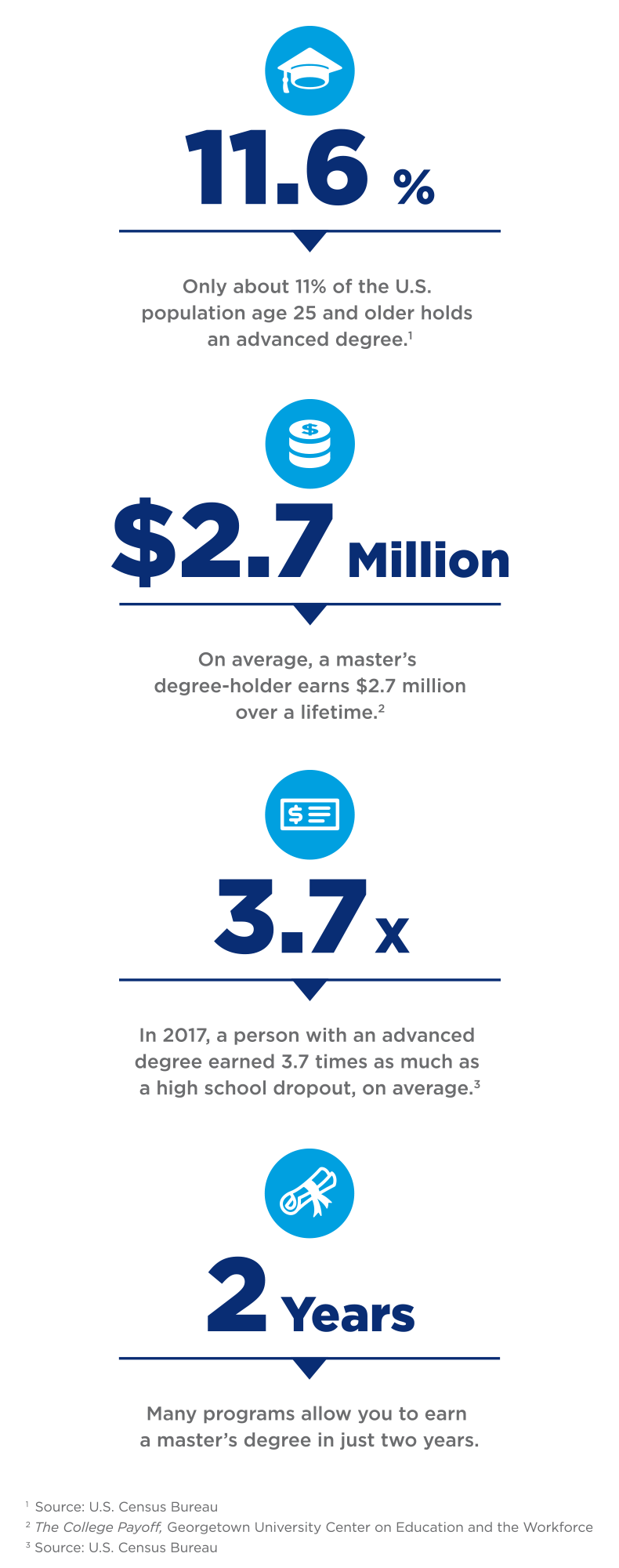4 Reasons to Get a Master’s Degree
GRADUATE STUDIES | BY TIM PANFIL | 6 MIN READ

Ever wonder to yourself, “Why go to grad school?” Here’s why: A formal, advanced education is a credential that no one can take away, and it’s a gift that keeps on giving throughout your lifetime.
At this particular moment, that rings especially true. As America continues to work through the pandemic, and employers are navigating “The Great Resignation,” this might just be the ideal time to go back to school and earn your master’s degree.
The decision to advance your education is a personal one, and there are many reasons to do so. But consider these four compelling reasons to get a master’s degree and take your education, and career, to the next level.
1. You’re Joining an Elite Club
Bragging rights. The most recent data available from the National Census for Education Statistics (NCES) indicates that only about 13% of Americans over the age of 25 hold an advanced degree. That’s a pretty select group—and there are no annual membership fees.
Yes, bragging rights at the family BBQ are justified, but also consider the sense of personal accomplishment you will have upon completing a master’s degree or graduate certificate program. Not to mention how stimulated your brain will be with the added knowledge.
You’ll become what those of us in continuing education refer to as a “lifelong learner.” Your advanced studies will also keep you apprised of what’s happening in your career field and allow you to keep up with new the latest trends, new innovations, and best practices. Your degree can open up a world of possibilities.
2. You’ll Be Investing in You
Show me the money! According to Kiplinger, median annual earnings of $50,281 for someone with a bachelor’s degree climb to $73,100 for advanced-degree holders. That’s almost $23,000 more per year in earnings.
On average, over the course of a 40-year career, those with a master’s degree make $400,000 more than people with just a bachelor’s degree (source: Georgetown University). Compared with a high school diploma, an advanced degree can translate into more than $1 million in lifetime earnings.
That’s a pretty impressive lifetime ROI. And grad school can be a lot more affordable than you might think, especially if you attend a part-time program and can tap into tuition assistance from your employer. It has always amazed me how many people fail to take advantage of employee tuition benefits. That’s like winning the lottery but never cashing in your ticket.
3. You’ll Stand Out in Today’s Job Market
 Get hired. Get promoted. Change careers. Having a graduate degree on your resume will help you stand out in the job market.
Get hired. Get promoted. Change careers. Having a graduate degree on your resume will help you stand out in the job market.
The COVID-19 pandemic combined with The Great Resignation has caused the largest loss of jobs since the last recession. As the economy begins to bounce back, employers will be looking to hire the best and brightest candidates possible. Given two equally qualified candidates in terms of work experience, who do you think they’ll choose to interview first—the person with a master’s degree or the person with a bachelor’s degree?
However, if moving up the career ladder is your goal, what better way to do so than earning an advanced degree? Completing your degree demonstrates you have the capacity to continue learning and improve your skillset. In fact, much of what you learn in grad school can be immediately applied to your current (or future) position. And let’s not underestimate the power of the connections and networking opportunities you’ll have with classmates and university faculty.
According to the U.S. Bureau of Labor Statistics, occupations that typically require a master’s degree are projected to grow at a rate of 16.7% through 2026. That’s more than twice the rate of growth projected for all occupations, 7.4%.
4. You’ll Likely Have Better Employment Security
Keep your job. If the increased income potential associated with an advanced degree doesn’t motivate you to apply to graduate school, perhaps knowing that you are less likely to be unemployed will?
According to 2020 U.S. Bureau of Labor Statistics data, the unemployment rate for someone with a master’s degree is 4.1%. Compare that with the rate for someone who holds a high school diploma (9%) or a bachelor’s degree (5.5%).
There you have it. Four compelling reasons to earn your master’s degree. Bottom line: Grad school is probably less of a mountain to climb than you might think. Most programs allow for part-time studies and are designed to be completed in two years, so you’ll only have to make minor, temporary modifications to your current professional and personal commitments.
By and large, grad school is a wise investment. The time, money and effort you put into earning your degree will pay back dividends including higher income potential, lower unemployment rates, and a way to differentiate yourself in a competitive job market.
Earn Your Master’s at Elmhurst University
Elmhurst University offers 15 master’s degrees and nine graduate certificate programs. Earn your credential in business, education, health care, or technology. Most of our programs are designed to be completed on a part-time schedule—ideal for busy professionals.
Fill in the form below to let us know you are interested!






